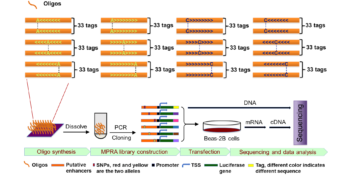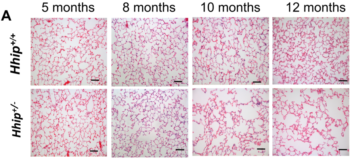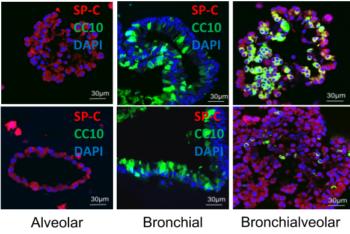Chronic obstructive pulmonary disease (COPD) ranks as the third leading cause of death in the U.S. It is characterized by thickening of the airway wall and emphysematous destruction in distal lungs. Despite smoking is the major risk for COPD, a substantial portion of differences in COPD susceptibility are due to genetic factors, with an estimated heritability of ~25-60%. Genome-wide association studies (GWAS) have identified susceptibility loci for many complex diseases including COPD. However, in-depth functional and mechanistic studies targeting GWAS candidate genes in the post-GWAS era have been relatively limited. To address this, we will:
1) link GWAS genetic variants to disease causal genes;
2) identify functional variants within GWAS regions;
3) determine function of these novel GWAS genes in murine models;
4) connect these seemingly isolated new genes by shared signaling pathways important for lung homeostasis.
We thanks funding supports from NIH National Heart, Lung, and Blood Institute R01HL147148; P01HL132825; R01HL137927; R01HL148667; R01HL127200; R01HL152728; P01HL114501; R01HL118455.

Link GWAS Variants to Novel Disease Genes
More than 50% of GWAS regions identified in complex traits are located in the non-coding regions of human genome, indicating potential regulatory roles of these functional variants. More>>

Identification of Functional Variants in the COPD GWAS Regions
We apply a semi-high throughput method to search for functional variants in the COPD GWAS locus. More>>

Function of GWAS Genes in COPD
Though GWAS is powerful to pinpoint novel disease candidate genes, the importance of GWAS genes in vivo has been questionable. More>>

Lung Regeneration and Repair Machinery
In response to environmental injuries, adult lungs will reactivate a series of developmental important pathways, such as Hedgehog, TGF-beta, Wnt/beta-catenin and Notch pathways to fulfill the regeneration functions. More>>

Metabolic Reprogramming in COPD
Bioenergetics homeostasis is important for cells to sustain normal functions and defend against injury. Genetics controls on bioenergetics homeostasis, including lipid and glucose metabolism remain poorly understood in chronic obstructive pulmonary diseases (COPD). More>>